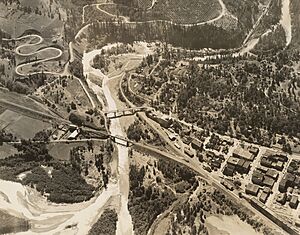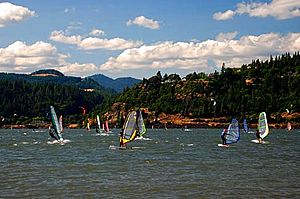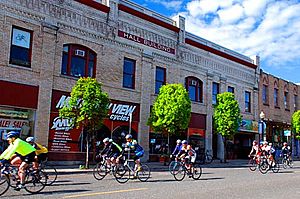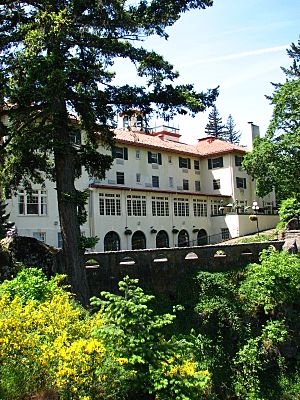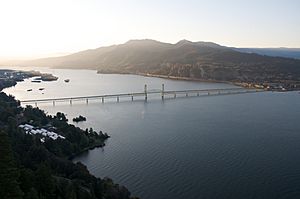Hood River, Oregon facts for kids
Quick facts for kids
Hood River, Oregon
|
||
|---|---|---|
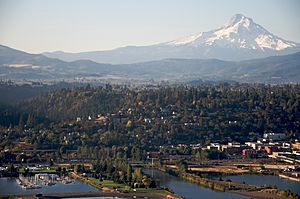
Aerial photo of the city of Hood River
|
||
|
||
| Nickname(s):
Windsurfing Capital of the World
|
||
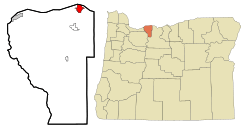
Location in Oregon
|
||
| Country | United States | |
| State | Oregon | |
| County | Hood River | |
| Incorporated | 1895 | |
| Area | ||
| • Total | 3.40 sq mi (8.80 km2) | |
| • Land | 2.60 sq mi (6.72 km2) | |
| • Water | 0.80 sq mi (2.07 km2) | |
| Elevation | 279 ft (85 m) | |
| Population
(2020)
|
||
| • Total | 8,313 | |
| • Density | 3,202.23/sq mi (1,236.16/km2) | |
| Time zone | UTC−8 (Pacific) | |
| • Summer (DST) | UTC−7 (Pacific) | |
| ZIP code |
97031
|
|
| Area code(s) | 458 and 541 | |
| FIPS code | 41-34900 | |
| GNIS feature ID | 2410787 | |
| Website | www.cityofhoodriver.gov/ | |
Hood River is a city in Oregon, United States. It is the main city and center of Hood River County, Oregon. The city is a port located on the Columbia River. It gets its name from the nearby Hood River.
As of the 2020 census, about 8,313 people live in Hood River. The city is often called the "Windsurfing Capital of the World" because of its great conditions for water sports.
Contents
History of Hood River
The area where Hood River is now was first called Dog River. A post office was set up there on September 30, 1868. It was named by Mary Coe, who started the city with her husband Nathaniel Coe.
The city of Hood River officially became a city in 1895. At first, it was part of Wasco County. Later, in 1908, it became the main city of the new Hood River County.
A Time of Change in Hood River
During World War II, a difficult event happened in Hood River. In 1944, the names of 16 Nisei servicemen were taken off a local "roll of honor." These were American soldiers of Japanese heritage. This action was part of a wider effort to stop Japanese Americans from returning home after being held in special camps by the U.S. government.
Many people across the country were upset by this. Five weeks later, a local Japanese American soldier died heroically in the Philippines. Because of strong pressure, the names of the Nisei soldiers were put back on the wall of the county courthouse on April 29, 1945. This showed the community's commitment to fairness.
Geography and Location
Hood River is located where the Hood River meets the Columbia River. This area is known as the Columbia River Gorge. The city is about 30 miles (48 km) north of Mount Hood, which is the tallest mountain in Oregon.
Across the Columbia River from Hood River is White Salmon, Washington. South of the city is the Hood River Valley. This valley is famous for growing many fruits like apples, pears, and cherries.
The city covers a total area of about 3.35 square miles (8.68 square kilometers). About 2.55 square miles (6.60 square kilometers) of this is land, and 0.80 square miles (2.07 square kilometers) is water.
Climate in Hood River
Hood River has a moderate climate. It is located where wet forests meet dry desert areas. Winters are rainy, and summers are warm. The city gets about 30 inches (760 mm) of rain each year. This is less than Portland to the west but more than The Dalles to the east.
The area is well-known for its strong, steady winds. These winds blow through the Columbia River Gorge. Temperatures are a bit cooler than other towns in the region, especially at night. This is because cool air flows down from the surrounding mountains.
People of Hood River
| Historical population | |||
|---|---|---|---|
| Census | Pop. | %± | |
| 1880 | 200 | — | |
| 1890 | 201 | 0.5% | |
| 1900 | 766 | 281.1% | |
| 1910 | 2,331 | 204.3% | |
| 1920 | 3,195 | 37.1% | |
| 1930 | 2,757 | −13.7% | |
| 1940 | 3,280 | 19.0% | |
| 1950 | 3,701 | 12.8% | |
| 1960 | 3,657 | −1.2% | |
| 1970 | 3,991 | 9.1% | |
| 1980 | 4,329 | 8.5% | |
| 1990 | 4,632 | 7.0% | |
| 2000 | 5,831 | 25.9% | |
| 2010 | 7,167 | 22.9% | |
| 2020 | 8,313 | 16.0% | |
| source: | |||
In 2020, the city of Hood River had a population of 8,313 people. There were 3,508 households in the city. The population density was about 3,197 people per square mile (1,236 per square kilometer).
About 21.5% of the people living in Hood River were under 18 years old. The average age in the city was 36.6 years.
Economy and Jobs
Hood River's economy has always relied on three main things: farming, tourism, and sports. Since the late 1990s, new technology companies, especially in aerospace engineering, have become big employers.
Hood River has been a farming center for a long time. It was once known for logging and fruit orchards. Now, it focuses more on growing apples and pears, as well as many wineries. Many local orchards and wineries are part of the famous "Fruit Loop" tour.
Tourism grew a lot after Hood River became popular for windsurfing and kiteboarding. The area is also great for kayaking, mountain biking, skiing, and hiking.
Because of its beautiful location in the Columbia Gorge, surrounded by farms and near Mount Hood, Hood River is a very popular place for tourists to visit. Many magazines like National Geographic Adventure and Sunset have praised the city. It has won awards like "coolest small town" and "fifth best ski-town in America."
Other important businesses in Hood River include Hood River Distillers, Full Sail Brewing Company, and Turtle Island Foods, which makes vegetarian food like Tofurky.
Arts and Culture
Hood River is a hub for artists, writers, and creative people. It is set against the amazing Cascade Mountains and the Columbia River Gorge. In 2018, Hood River was ranked as one of the top small cities for arts.
The Performing Arts Initiative is a group working to build a performing arts center in the Columbia River Gorge. The Columbia Gorge Orchestra Association (CGOA) is another group that includes six music groups.
Hood River is a walkable city with many art galleries downtown. There is a public art walking tour called BIG ART. It shows sculptures and other outdoor art around the town.
Yearly Events
Many fun events happen every year in the Hood River Valley. These include:
- Hood River Valley Blossom Time (April)
- Hood River Hard-Pressed Cider Fest (April)
- Hood River Hops Fest (October)
- Hood River Valley Harvest Fest (October)
The Harvest Fest was even named one of the best harvest festivals in the U.S. by FoodandWine.com in 2012.
The Roy Webster Cross-Channel Swim is the oldest swimming event on the Columbia River. It takes place in Hood River every Labor Day. Hood River has also hosted the U.S. Windsurfing National Championships multiple times.
Museums and Interesting Places
Hood River has the History Museum of Hood River County and the Western Antique Aeroplane and Automobile Museum.
The city has over two dozen places listed on the National Register of Historic Places. One famous example is the Columbia Gorge Hotel, built in 1920. The oldest house in the city is the Ezra L. Smith home, built in 1886.
Parks and Outdoor Fun
Hood River is the start of the Mount Hood Scenic Byway and a big part of the Historic Columbia River Highway. It is known as a "sports mecca" because it offers some of the best places for:
- Windsurfing
- Kitesurfing
- Kayaking
- Standup paddleboarding
- Skiing
- Mountain biking
The Port Commission has created "The Hook," a safe harbor for learning windsurfing. The city also has Waterfront Park, a public pool, a skate park, and many biking trails and ball fields. The valley has two 18-hole golf courses. The Crag Rats, the nation's oldest volunteer search and rescue team for mountains, are based in Hood River.
Education in Hood River
Public schools in Hood River are part of the Hood River County School District. Hood River Middle School has a new garden, greenhouse, and a special energy-saving music and science building. This is part of their Outdoor Classroom Project.
The city also has a campus of Columbia Gorge Community College. Horizon Christian School is a private school for students from kindergarten to 12th grade. The public Hood River Valley High School is also in the city.
In 2017, Rachel Harry, a theater teacher at Hood River Valley High School, won the Excellence in Theatre Education Award at the 71st Tony Awards. This award recognized her amazing theater program.
Media in Hood River
Newspapers
The Columbia Gorge News is a weekly newspaper published on Wednesdays. It serves Hood River and nearby towns.
Radio Stations
- KIHR AM 1340/98.3 FM
- KODL AM 1440/99.1 FM
- KQAC FM 88.1
- KMSW FM 92.7/102.9
- KOPB-FM FM 94.3
- KZAS-LP FM 95.1 Radio Tierra
- KACI-FM 93.5
- KCGB-FM 105.5/96.9
Television
- K34KE-D (a translator for KGW Portland, an NBC channel)
- K23OV-D (a translator for KOIN Portland, a CBS channel)
- CGN-7 Gorge TV
Magazines
Two local magazines cover the area: Columbia Gorge Magazine and The Gorge Magazine. They feature recreation, dining, shopping, and arts in the Columbia Gorge area.
Transportation and Services
Getting Around
- Air Travel
Hood River has one airport, the Ken Jernstedt Airfield. It is used for small planes and does not have regular airline flights. The closest major airport is Portland International Airport, about an hour's drive away.
- Roads
Interstate 84 and Oregon Route 35 both pass through Hood River.
- Trains
Hood River is the northern end of the Mount Hood Railroad. This is a heritage railway that offers fun passenger trips. Union Pacific Railroad also provides freight service to the city.
- Buses
Greyhound Lines offers national bus service to Hood River. Local bus services are also available from Columbia Area Transit and Mount Adams Transportation Service.
- Water Travel
The Port of Hood River manages a public marina and helps with waterfront projects. The port also manages the airport and the Hood River-White Salmon Interstate Bridge.
City Services
The City of Hood River provides water and wastewater treatment. NW Natural supplies natural gas, and PacifiCorp provides electricity.
Healthcare
Hood River has one hospital, Providence Hood River Memorial Hospital.
Sister City
Hood River has one sister city, which helps build friendships between different places:
 Tsuruta, Japan
Tsuruta, Japan
Images for kids
See also
 In Spanish: Hood River (Oregón) para niños
In Spanish: Hood River (Oregón) para niños




